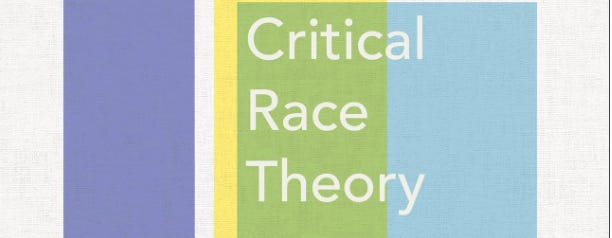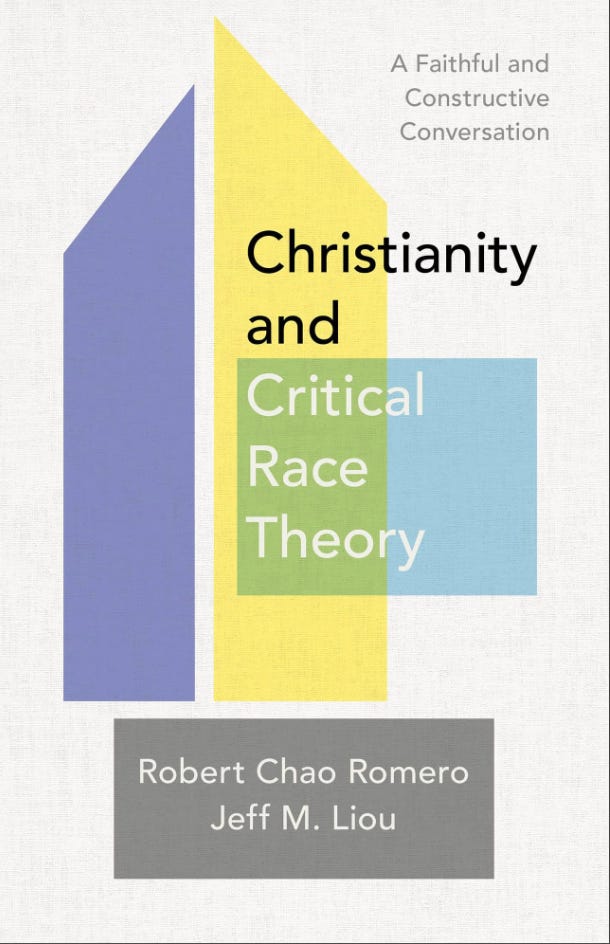Let's Talk about Critical Race Theory
Those who don’t believe in racism are merely gremlins in the system. Those who don’t think racism is systemic have chosen to ignore the obvious in order to protect the privileged. Racism is systemic, pervasive, invisible to some and blatantly obvious to others, and we need a discipline that manifests the realities of systemic racism. Prophetic critique, even that based on Galatians 3:28 or the macroscopic visions of Revelation help. But we need a tool that persistently and relentlessly examines the infiltration of racism into the American system.
The tool is called critical race theory, and Robert Chao Romero (Asian-Latino) and Jeff Liou can be our guides in their new book Christianity and Critical Race Theory: A Faithful and Constructive Conversation. Those who need this book need to read it. Drop the stereotypes and listen to two accomplished thinkers and writers who have experiences, the mastery of intellectual disciplines, and the Christian theology to produce a study designed for Christians.
What is it?
Critical race theory examines the intersection of race, racism, and US law and policy. In other words, it looks at how US laws and public policy have been manipulated and constructed over the years to preserve privilege for those considered white at the expense of those who are people of color.
Robert Chao Romero is no stranger to my blogs and Substacks. His Brown Church was brilliant. He has a law degree; he has a PhD in history; he teaches at UCLA. He has a voice we all need to hear.
Racism is “ordinary”; there are material advantages for the privileged not to see racism or eradicate it; race itself is socially constructed because there is “no biological or genetic reality” to race; and persons of the color are the ones who experience racism and see it and can manifest it to whites (this a summary of Delgado and Stafancic).
Whiteness becomes property, or property compacts into whiteness, and then Christianity is added to that property – and colonialism justified itself as incorporating into itself white property and religion.
The Christian faith, for those with a mind to examine the facts, is growing among persons of color though the systems of American Christianity remain structurally white. Persons of color often perceive institutions as white institutions. When such comments are made to me they stop me in place.
Robert Chao Romero contends he has been able to “share the gospel… with thousands” while “using CRT as a cultural bridge.” He admits not all of CRT is Christian but he is also aware that much in CRT aligns with the Christian faith.
Racism, he contends, is ordinary in part because humans are sinful, because sin is every bit as ordinary. Prejudice and racism are part of the sinful human condition.
Community cultural wealth, an important synthetic category for social science, recognizes that Latino and Latina students do not lack cultural wealth but instead possess a different form of cultural wealth. Their system and the white system don’t always overlap. Every ethnic group possesses community cultural wealth. No one who has experienced a Black or Brown church (Romero’s examples) leaves without experiencing a different community cultural wealth, some of which or most of which white churches don’t have. Many today leave the white church because their cultural wealth is not deemed worthy of the gift of presence. God is not color-blind, which means elevating whiteness; God is ethnic conscious and color-conscious.
Jeff Liou is the child of Taiwanese immigrants to the USA, and his father was a medical doctor in rural Oklahoma. Liou’s consciousness of his ethnicity developed over time, and he has become a leader in Asian InterVarsity. Here he explored the distinction of the Asian experience vs. the more common categories and insights in diversity training. He pursued theology and pastoral training at Fuller, and there he began to see the insights of CRT.
In this book these two authors seek to model integrating sound theology with CRT in a way that is respectful and critical. Liou points to the mass shooting in Atlanta on 16 March 2021 where the church of the shooter did not take responsibility for how it shaped the shooter’s “heart and mind.” The explanation was pure individualism with no regard the systemic impact of a collective. An increasing number of Asians are experiencing racism.
To the contrary, CRT enables us to identify the ways in which certain theologies, in an ill-fated attempt to same-ify and flatten what God has made beautifully diverse, result in the most polite, psychological, and physical death dealing…. In order to condemn racism in all its forms, one must understand the novel, viral strains of racism that are emerging. CRT is actually indispensable in this regard because it, too, organizes and operationalizes the collective memories of racism and understanding of systems and structures that work against Asian Americans.
Dismissing CRT is the “false peace” of the privileged.




This sounds very challenging. To one who first learned about CRT from the pens of conservatives denouncing the whole idea, I think I may have some rethinking to do.
"We need a tool that persistently and relentlessly examines the infiltration of racism into the American system..." That is the heart of it for me, and why I get so frustrated with much of the dialogue about CRT in the (majority white) evangelical world. We who proclaim "repent and believe" ought to be those who most welcome tools that show us the real and profoundly devastating shape of sin in the world!